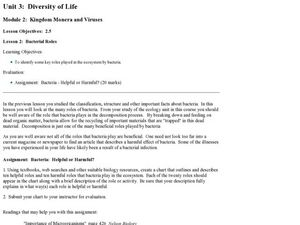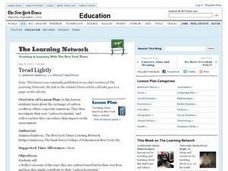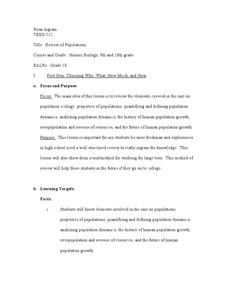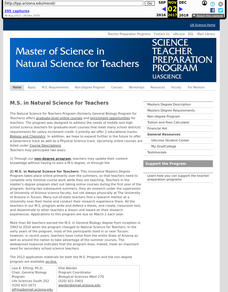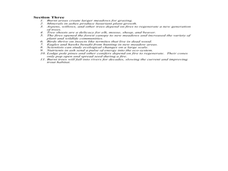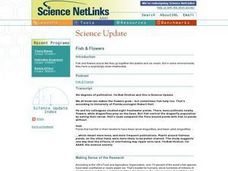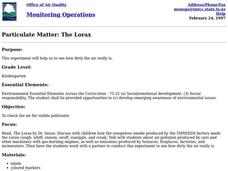Curated OER
Organisms – Their Needs
Students compare and contrast different organisms characteristics. For this life science lesson, students design an experiment about plants and animals needs. They collect data and write their conclusion about the experiment.
Curated OER
Bacterial Roles
Young scholars study bacteria and the role it plays in the ecosystem. In this bacteria lesson students research the roles bacteria has and submit a chart.
Curated OER
Laws of the Jungle
Middle schoolers build a video game on predator-prey relationship. In this biology lesson, students identify the variables that affect this relationship. They write a short description and play each other's game.
Curated OER
Paper, Microorganisms, and Biocides
Students study the paper making process and discuss the implications of recycling paper. Students conduct a lab to determine if microorganisms are present in different solutions used in the papermaking process today.
Curated OER
The Case of the Disappearing Frogs
Learners complete an Internet based activity to investigate the case of the disappearing tadpoles. They discover the interrelationship of living things.
Curated OER
Scientific Approach to Forest Management
High schoolers use wireless laptop computers to collect, store, communicate, and organize data from the 1999 Jasper Fire area. They collect data in the field and compare it to student-collected data from prior years to develop...
Curated OER
Children's Health: Children Aren't Little Adults
This lesson plan is a compilation of interdisciplinary, technology-infused activities that focus on the often complicated and sometimes controversial issues related to toxic chemicals in children's environment. Special emphasis is placed...
Curated OER
Wetland Ecosystem Conservation
Pupils read articles about wetland ecosystem conservation in Florida and other countries. They summarize information found in the articles. Students reflect on the information in the articles and write their feelings.
Curated OER
Stream Flow in Blacks Creek
Young scholars explore what factors affect the stream flow in a local body of water. They collect data to measure stream flow and discharge and construct a hypothesis concerning the factors affecting stream flow.
Curated OER
De"compost"ition Activity
Young scholars investigate the decomposition process and the parameters which influence the rate at which it occurs. They design a "controlled" experiment by comparing decomposition rates between two compost piles. Analysis questions...
Curated OER
Human Effects and World Problems
Learners engage in a lesson that is concerned with the concept of world problems and some of the human effects upon the causes. They pick a problem and conduct research using a variety of resources. Students use the information in order...
Curated OER
Tread Lightly
Students investigate the use of carbon fuels and how they effect the environment. They conduct research using a variety of resources. The information is used from the reading to calculate one's personal influence upon the environment.
Curated OER
Elements of Biology: Biomes
Young scholars describe the different types of biomes. In this biology instructional activity, students create a map of assigned biome with descriptive paragraphs. They share their findings to class.
Curated OER
Review of Populations
Students review the concept of populations. In this Biology lesson plan, students will work with a partner to talk through what they remember from the unit on populations. The class will then begin to work through a concept map as a way...
Curated OER
Introduction to Biomes
Eighth graders identify the different kinds of biomes. In this life science instructional activity, 8th graders explain their importance in an ecosystem. They take a BrainPop quiz at the end of the instructional activity..
Curated OER
Ecology
Students learn what the Kyoto Protocol is and examine the decision of the United States to not sign the agreement.
Curated OER
Fishing for Solutions
Young scholars investigate the many ecological and economic issues related to over fishing the world's marine resources. Working in committees, students research the related topics of equipment and fishing techniques.
Curated OER
Spiders: An Organism for Teaching Biology
In this unit, the students explore basic ecology concepts and scientific processes using spiders as model organisms. They capture spiders, observe and care for them, and use them to answer their own questions about spider behavior....
Curated OER
Yellowstone fires: To Burn or Not to Burn
Students determine the causes of the 1988 Yellowstone fire. They list firefighting techniques, describe the aftermath, and list the ecological outcomes of the fire. They perform experiments with ignitable materials found in Yellowstone...
Curated OER
Fish and Flowers
Young scholars read and discuss a research article that explains the unlikely link between increased fish populations and increased plant pollination. They answer reading guide questions to discover this ecological relationship.
Curated OER
A Study of Grasses on the American Prairie
Fifth graders study the ecology and impact of animal and human life as it relates to the environment of the Great Plains and its grasses. They compare types of grasses with a rainfall map to illustrate the effect of precipitation on...
Curated OER
Deep Gardens
Students compare and contrast deep-sea coral reefs with shallow-water coral reefs. In this underwater ecology lesson, students describe three types of coral and explain why scientists are concerned about the future of deep-sea coral.
Curated OER
"Water is Life" Global Water Awareness
Students examine and calculate the percentage of potable water remaining on the earth. In this ecology and geography lesson, students brainstorm the main factors affecting water distribution. Students use mathematical problem solving to...
Curated OER
Particulate Matter: The Lorax
Students explore air pollution. For this ecology lesson, students participate in an experiment in which 5 numbered jar lids are placed outside. Students bring one lid a day in until all jars are inside. Dirt specks are counted, observed,...
Other popular searches
- Population Ecology
- Animal Ecology
- Human Ecology
- Behavioral Ecology
- Ecology Principles
- Community Ecology
- Pond Ecology
- Ecology Organizations
- Global Ecology
- Ecology Ethics
- Ecology Food Webs
- Ecology and Plants



